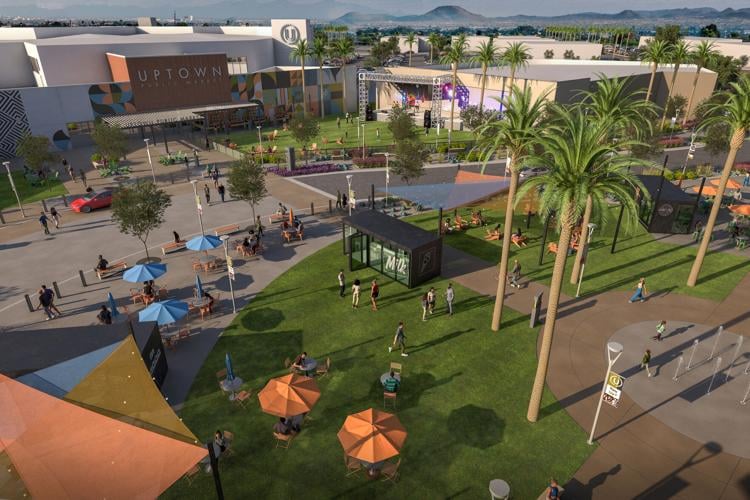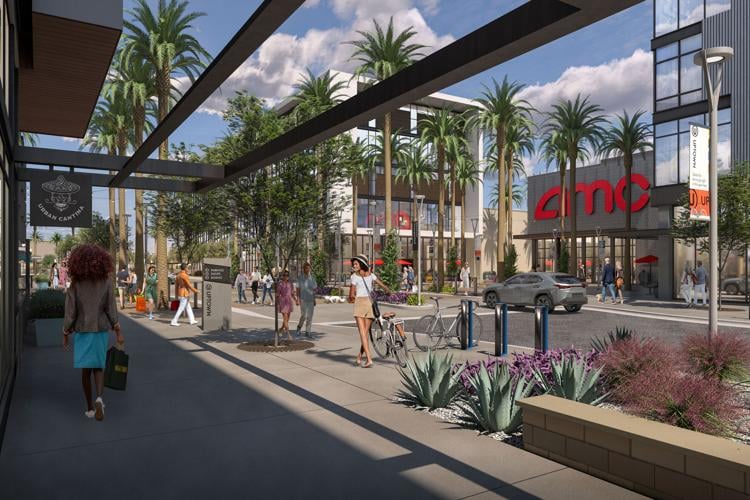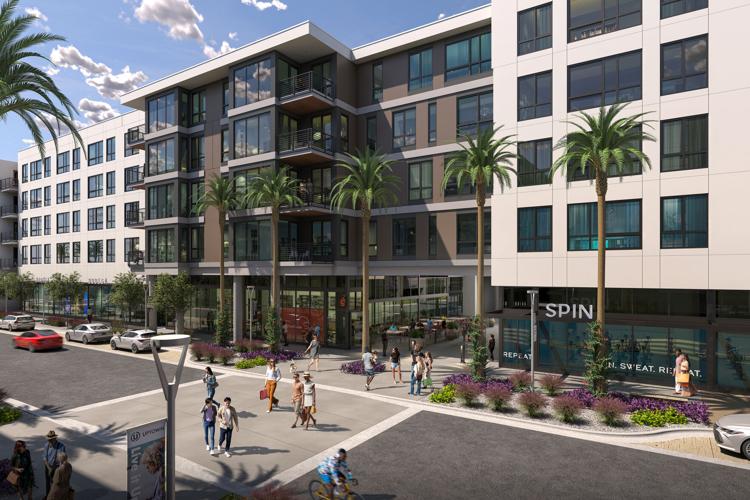A local developer is planning an entertainment venue that is expected to make northwest Tucson as big of a draw as the downtown area has become.
Called Uptown, the $500 million project is close to breaking ground at the site of the former Foothills Mall on Ina Road and La Cholla Boulevard.
The 51-acre development by Bourn Cos. will include shops, restaurants that spill out onto patios, an entertainment stage, event lawn and splash pad, video screens, a public market, apartments and hotels.
With inspiration drawn from places such as Santana Row in San Jose, California, and Scottsdale Quarter, Uptown will offer an environment unique in the Tucson market, said Don Bourn, the company’s president and CEO.
“We have a great downtown, why not an Uptown?” he said. “It’s an urban environment in a suburban setting and creates multiple places with different lifestyle elements to make a better community.”
Demolition of the former indoor mall is underway, and construction of Uptown’s first phase is expected to begin in August and last about two years.
The first phase will include an apartment complex with 157 units ranging in size from studios to three-bedroom models.
Among the amenities will be a pool deck, elevated above the ground floor public space, and a private rooftop deck for residents.
A hotel with up to 300 rooms will also go up at the site. A brand has not yet been announced.
Bourn envisions up to three hotels at Uptown at full build-out in about eight years, as well as two or three more apartment buildings.
“Down the road, we may add condominiums, townhouses and active senior housing,” he said. “It will be something very different for Tucson.”
The public space, with a large lawn, stage and screens, can be used by local musicians, artists or a farmers' market.
An indoor public market will be created near the existing Barnes & Noble, where local businesses can rent stalls in an exhibition hall-style setting.
Also, national retailers that are not currently in the Tucson market can test the waters with a small presence.
“It will no longer be a traditional mall,” Bourn said. “It will be pedestrian focused.”
The parking garages will be located on Uptown’s perimeter.
As the project was being imagined, Bourn’s team traveled around the country to visit similar entertainment hubs.
“We have a unique opportunity to provide this type of environment locally,” Bourn said, “an urban resort that’s not behind gates and you can live there or visit for the day or for a week.”
To accommodate families, Uptown will also have daycare so parents can plan the day with the kiddos and then have somewhere to leave them if they’d like some grownup time.
“By paying attention to detail,” Bourn said, “we hope people feel like this is their space and think, ‘Let’s head Uptown.’”
Foothills Mall was built in 1982. Bourn owned it from 1994-99 and took it from 12% occupancy to 95% occupancy. Bourn bought the mall again in 2016.
This will be the company’s third large mixed-use center locally.
The Bridges, near Park Avenue and Interstate 10, is anchored by Costco and Walmart and has offices, restaurants and hotels.
Likewise, The Landing, on Irvington Road and Interstate 19, has a Sprouts grocery store and various restaurants and entertainment spots and a hotel under construction as well as an apartment complex.
While some retailers at those sites may also open at Uptown because of their established relationship with the company, Bourn thinks the project will also bring new businesses to Tucson.
The area around Uptown is densely populated, with about 154,131 people within 5 miles of the property, with a median household income of $95,214.
“There are stores that may not have considered the Tucson market before,” Bourn said. “Our hope is when they see the scope of this project, they will consider Tucson.”
The Uptown website, headuptown.com, will be live Monday, May 15, for those interested in receiving updates.
These renderings show the planned $500 million Bourn Companies project at the site of the former Foothills Mall. Photos provided by Bourn Cos.
The concept of creating mixed-use projects at old malls has taken off in the past several years as traditional shopping venues have lost foot traffic to online vendors.
“Retail-to-residential conversions range from apartment buildings that are springing up in what were once mall parking lots or the former sites of closed big box stores, to partial or complete ‘scrapes’ in which malls and shopping centers are torn down and replaced with mixed-use communities with plenty of housing,” according to a recent report by the Urban Land Institute. “Retail center owners increasingly see residential as both a new revenue source and a way to invigorate stores by putting potential consumers in close proximity.”
That type of redevelopment is also scoring environmental points.
Conversions improve sustainability, the Urban Land Institute report says, quoting architect Daniel Gehman of Danielian Associates, based in Irvine, California, who has worked on numerous retail-to-residential projects.
Stormwater that once collected residue from cars in asphalt parking lots, for example, can instead be diverted and treated in new residential projects.
Locally, developers are eyeing possible residential development at Park Place Mall on Broadway.
“It just is better for the environment,” Gehman says. “It fits with the whole idea of developing places that are already developed and densifying, as opposed to just sprawling everywhere.”






